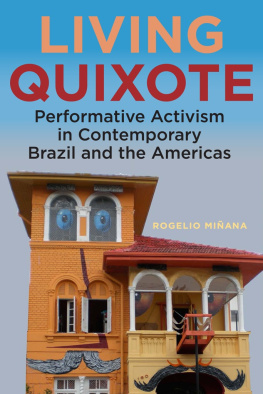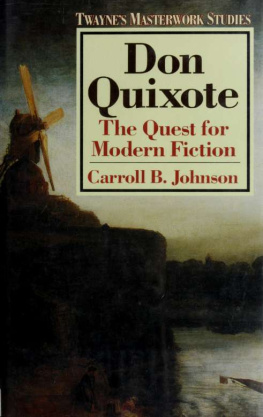LIVING QUIXOTE
Performing Latin American and Caribbean Identities
KATHRYN BISHOP-SANCHEZ,series editor
This series is a forum for scholarship that recognizes the critical role of performance in social, cultural, and political life. Geographically focused on the Caribbean and Latin America (including Latinidad in the United States) but wide-ranging in thematic scope, the series highlights how understandings of desire, gender, sexuality, race, the postcolonial, human rights, and citizenship, among other issues, have been explored and continue to evolve. Books in the series will examine performances by a variety of actors with under-represented and marginalized peoples getting particular (though not exclusive) focus. Studies of spectators or audiences are equally welcome as those of actorswhether literally performers or others whose behaviors can be interpreted that way. In order to create a rich dialogue, the series will include a variety of disciplinary approaches and methods as well as studies of diverse media, genres, and time periods.
Performing Latin American and Caribbean Identities is designed to appeal to scholars and students of these geographic regions who recognize that through the lens of performance (or what may alternatively be described as spectacle, ceremony, or collective ritual, among other descriptors) we can better understand pressing societal issues.
LIVING QUIXOTE
Performative Activism in Contemporary Brazil and the Americas
ROGELIO MIANA
VANDERBILT UNIVERSITY PRESS
Nashville, Tennessee
2020 by Vanderbilt University Press
Nashville, Tennessee 37235
All rights reserved
First printing 2020
This book is printed on acid-free paper.
This study was funded in part by the College of Arts and Sciences at Drexel University
LIBRARY OF CONGRESS CATALOGING-IN-PUBLICATION DATA
Names: Miana, Rogelio, 1972 author.
Title: Living Quixote : performative activism in contemporary Brazil and the Americas / Rogelio Miana.
Other titles: Performing Latin American and Caribbean identities.
Description: Nashville : Vanderbilt University Press, 2020. | Series: Performing Latin American and Caribbean identities; Book 2 | Includes bibliographical references and index. | Summary: Examines contemporary appropriations of Miguel de Cervantess masterpiece in political and social justice movements in the Americas, particularly in Brazil. The author examines long-term, Quixote-inspired activist efforts at the ground level, offering an applied model for cultural activism or, as he calls it, performative activismProvided by publisher.
Identifiers: LCCN 2019026478 (print) | LCCN 2019026479 (ebook) | ISBN 9780826522689 (Hardcover : acid-free paper) | ISBN 9780826522696 (Paperback) | ISBN 9780826522702 (eBook)
Subjects: LCSH: Theater and societyAmerica. | Social problemsAmerica. | Cervantes Saavedra, Miguel de, 15471616. Don QuixoteAdaptations.
Classification: LCC PN2219.3 .M56 2020 (print) | LCC PN2219.3 (ebook) | DDC 791.0981dc23
LC record available at https://lccn.loc.gov/2019026478
LC ebook record available at https://lccn.loc.gov/2019026479
CONTENTS
ACKNOWLEDGMENTS
This book, which represents a significant methodological and cultural departure from my previous scholarship on seventeenth-century Spanish prose, is the product of a collective effort. First and foremost, Mara Elena Cepeda was and continues to be my greatest support and my main source of professional inspiration. She encouraged me to pursue this project from the beginning, despite my methodological and linguistic limitations. A phenomenal writer and editor herself, she patiently took my written English to a place of relative stylistic solvency. As an interdisciplinary scholar of contemporary Latinx Studies, she guided me as I acquired the methodological tools that I needed to undertake the study of twenty-first-century Quixote-inspired cultural activism. In every way, the professional re-invention that this project required of me would have never happened without Mara Elena, and for that reason this book is hers as much as it is mine.
Of course, I owe this book to the activists and theater companies that have taken Don Quixote to the streets of Brazil, Colombia, Mexico, and the United States, to name only the countries that I study here. The intelligence, care, courage, and commitment that these literary and community activists display in their appropriations of Don Quixote never cease to amaze me. For a Cervantes scholar, this project is a dream come true, for it deals with activist applications at the local level of arguably the greatest piece of literature ever written. Don Quixote is a living entity today, and I have had the privilege to meet in person and work with people who are living and practicing it in the everyday. My heartfelt gratitude to Mrcio Meirelles, Chica Carelli, Valria di Pietro, Telma Dias, Andreia de Almeida, Csar Badillo, Graziela Bedoian, Auro Lescher, Stephen Haff, and their teams, not only for the access they granted me but most importantly for the Quixote-inspired work they do. The conviction that their projects had to be studied as an activist and intellectual exercise of the tallest order gave me the motivation and strength to finish this project.
I have not had the pleasure to meet in person the following individuals, although their Quixote-inspired activism is also prominently featured throughout my book: Peterson Xavier (formerly at Instituto Religare) and Silvio Galvo and Sandro Rodrigues (Cooperaacs) in So Paulo, Brazil; Bill George and Lisa Jordan (Touchstone Theater) in Bethlehem, Pennsylvania; and Arturo Morell (Don Quijote, un grito de libertad) in Miami and Mexico. To all of them, again, my most sincere gratitude. Laura Calejn, Maria Augusta da Costa Vieira, Javier Escudero, and Arturo Steely have accompanied me in different ways in my Brazilian travels; each one of them has been instrumental in my personal journey into Brazilian Quixote-inspired activism.
Very early and partial versions of some of the material dispersed throughout this book have been published as Righting Wrongs: Don Quixotes Other History in Brazilian Youth Theater, in Don Quixote: Interdisciplinary Connections, edited by James A. Parr and Matthew Warshawsky, Juan de la Cuesta, 2013, pp. 20322; The Don Quixote of the Streets: Social Justice Theater in So Paulo, Brazil, Cervantes vol. 31, no.1, 2011, pp. 15970; Don Quixote among Brazilians: Um tal de Dom Quixote (Mrcio Meirelles and Cleise Mendes, 1998), in Los cielos se agotaron de prodigios: Essays in Honor of Frederick A. de Armas, edited by Christopher B. Weimer et al., Juan de la Cuesta, 2017, pp. 32332; Don Quixote Never Dies in Brazil: Performative Appropriations of Don Quixote II.74 in Contemporary Brazilian Theater, in A Novel without Boundaries: Sensing Don Quixote 400 Years Later, edited by Carmen Garca de la Rasilla and Jorge Abril Snchez, Juan de la Cuesta, 2016, pp. 199216; and Don Quijote de las Amricas: Activismo, teatro y el hidalgo Quijano en el Brasil contemporneo, in El Quijote desde Amrica (Segunda parte), edited by Ignacio Arellano, Duilio Ayalamacedo, and James Iffland, Idea, 2016, pp. 24760. I thank the publishers for kindly giving me permission to reprint fragments of those early studies as part of this book.










